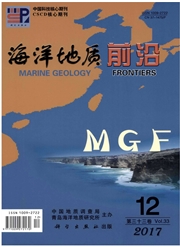

 中文摘要:
中文摘要:
对东太平洋海隆9°~10°N(9°50.01′N,104°17.44′W,水深2 200m)热液硫化物的主要组成元素测试资料研究表明,硫化物具有高Ca、Cu、Co、Se含量,低Pb、Mn、As、Cd、Ba和Au含量的特点,为富Cu型热液硫化物。热液硫化物中Cu与Co、Se、Ag、Cd等元素呈显著的正相关关系(R2〉0.8),而与Ca、Ba、Mn、Pb等元素呈负相关关系(R2〉0.8)。热液硫化物烟囱体中不同圈层化学成分的变化较大,稀土元素(REE)的含量从内层到外层逐渐变高,可以反映出硫化物生长过程中的不均一性和矿化条件的不同。热液硫化物中REE含量较低,具有明显的Ce负异常和LREE富集的特征,与海水的REE配分曲线基本一致,表明热液硫化物中的REE主要来源于海水。
 英文摘要:
英文摘要:
The chemistry of the hydrothermal sulfide taken from the East Pacific Rise at 9°~10°N(9°50.01′N,104°17.44′W,; at depth of 2200m), demonstrates that it is a kind of hydrothermal sulfide rich in Cu, Co, Se and poor in Pb, Mn, As, Cd, Ba, Au. The content of Cu has obvious positive cor- relation with Co, Se, Ag, Cd (R2〉0.8), but negative correlation with Ca, Ba, Mn, Pb (R2〉0.8). Changes in chemical composition is observed in different layers, and the content of rare earth elements gradually becomes higher.from the inner to outer part, indicating different minerogenetic conditions in its growth process. On the other hand, the sulfide has a lower content of P, REE, an obvious negative Ce anomaly and a slight LREE enrichment that is similar to seawater, indicating that the REE of the hydrothermal sulfide is originally from seawater.
 同期刊论文项目
同期刊论文项目
 同项目期刊论文
同项目期刊论文
 期刊信息
期刊信息
